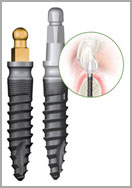Cost of mini dental implants
Mini dental implants, or small diameter implants, are much like traditional dental implants. Both are going to replace your missing teeth with permanent new teeth. This means that unlike dentures, your teeth aren’t shifting around or falling out. But the choice between what type of implant will be best for you will depend on your specific needs. If you’re considering mini dental implants vs. traditional implants, we’re going to talk about the pros and cons for each.

Mini dental implants can offer many benefits over regular implants: the screw that’s inserted into the jaw is a lot narrower, the procedure for inserting the implant screw is also less invasive, and the implant doesn’t need surgery.
Regular dental implants
With regular dental implants, the post (or implant screw) is much thicker. Your dentist will surgically implant the post into the jawbone—a procedure that requires surgery. But even though the procedure takes longer and can be more costly, the extra time and cost may be well worth it.
Regular implants usually last much longer than mini implants and are far more stable while you chew. Once your dentist attaches the crown to the dental post, it should feel just as stable as a natural tooth.
The downside is that not all patients are able to get dental implants. This is often because of the cost or because their bone density isn’t adequate to support it. Most good dentists will refuse to place implants when a patient’s jawbone density is insufficient. This is because the implants are likely to just fall out again. Additionally, implants performed on proper candidates will stimulate bone growth. But the opposite is true for those without proper bone density.
Mini dental implants
 While they aren’t always the better option, mini dental implants can offer many benefits over regular ones. With mini dental implants, the dental post screw is much narrower. So the procedure is also much easier on the patient, and there’s no need for surgery.
While they aren’t always the better option, mini dental implants can offer many benefits over regular ones. With mini dental implants, the dental post screw is much narrower. So the procedure is also much easier on the patient, and there’s no need for surgery.
Not only are mini dental implants more cost effective, but they also offer an alternative for patients who wouldn’t be able to get implants before. This is because mini implants don’t need as much jawbone support as regular implants.
But unfortunately, mini dental implants also don’t provide the same level of stability as regular implants. Furthermore, it’s possible for a patient to have insufficient jawbone density to support even mini dental implants. Also, because the procedure is relatively new, more studies are needed before we can know the exact longevity of mini implants.
While it’s certain that these implants can last for many years, it’s uncertain how well they’ll last compared to regular implants. But, just because they haven’t been in use for very long doesn’t mean they aren’t a safe option. The FDA has approved mini dental implants and they don’t pose any harm to patients.
There are many cases where mini implants prove to be an ideal alternative. Mini implants can support loose dental bridges or dentures. They also make for a good alternative when a patient wants to replace a missing tooth in an area where limited space could make placing a post for a regular implant challenging.
Average cost of mini dental implants
As with many other dental procedures, there are variables that can affect price. A single mini dental implant should cost between $500 to $1,500 for the implant itself. When you need 4 to 6 implants to support lower dentures, the cost ranges from $2,000 to $5,000.
This compares well to the cost of regular implants, which can range from $3,000 to $6,000 for a single tooth and $12,000 to $30,000 for implants that support lower dentures.
If you’re still trying to decide between mini dental implants vs. traditional implants, but feel concerned about the price, a CareCredit card may help. You’ll be able to pay off your procedure in monthly installments instead of all at once. With your CareCredit card, you’ll be able to pay for dental procedures at dental practices listed with the company, including Dr. Stone’s.
Dr. Stone has been working as a prosthodontist for more than 30 years and specializes in dental implants, veneers, and other procedures. Feel free to make an appointment (a consultation is FREE) if you want find out more about dental implants.


